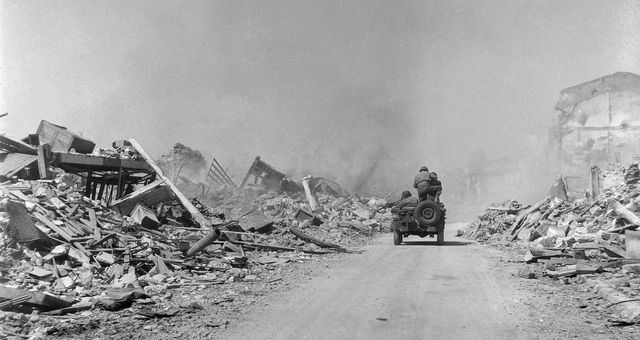- Home
- Middle East
- 1945 Revisited: Memory Still at War, 80 Years On

1945 Revisited: Memory Still at War, 80 Years On ©AFP
May 8, 2025, marks the 80th anniversary of the end of the Second World War. The world is preparing to pay tribute to this historic turning point. But the political use of the memory of 1945 reveals deep geopolitical fractures. Between celebration, revision or oblivion, narratives of the past are increasingly being transformed into tools of power.
This Thursday, May 8, marks a day of remembrance. Across the globe, heads of state, veterans and institutions will honor the heroes and victims of the Second World War. But behind the wreaths, anthems and solemn speeches lies a deeper truth: memory is not just remembered, it is contested and increasingly weaponized.
Eighty years later, the war is no longer merely a historical event, it has become an ideological battleground. Nations craft narratives shaped as much by identity and diplomacy as by facts. While some build collective identities around shared remembrance, others gradually erase the war from their official histories.
In Europe, national memories of the war diverge. In Germany, the duty of remembrance is deeply embedded in civic life, though signs of fatigue are emerging. In France, debates over the Vichy regime and the war’s links to colonialism persist. In Italy and Hungary, figures associated with 20th-century fascist regimes have at times reentered the political mainstream.
Though Europe promotes unity around democratic values, it continues to struggle with forging a truly collective narrative of the Second World War. Memory remains national, fragmented and often instrumentalized in present-day politics.
As the last survivors pass away, memory transitions from lived experience to discourse. Narratives clash. Beneath symbolic acts of remembrance, the Second World War remains a source of political contention.
History as Ideological Weapon
In other regions, the politics of memory are even more overt. In Russia, May 9, which is the commemoration of the Soviet Union’s victory over Nazi Germany, holds central symbolic power. The “Great Patriotic War” is foundational to the national narrative, embedded in state rhetoric, school curricula and media coverage.
For over a decade, President Vladimir Putin has weaponized this memory to consolidate power, framing Russia as the savior of humanity. Since the 2014 annexation of Crimea, and more intensely following the 2022 invasion of Ukraine, the Kremlin has depicted its adversaries as “neo-Nazis,” extending the moral capital of 1945 into modern conflict.
In response, Central and Eastern European nations, especially Poland and the Baltic States, have launched their own memory offensives. Laws criminalizing Soviet nostalgia have been enacted, Soviet-era monuments have been dismantled and wartime resistance figures have been publicly rehabilitated.
For these countries, post-1945 Soviet occupation represents a continuation of domination—one conspicuously absent from Moscow’s narrative.
This clash of memory is not symbolic alone, it reflects a broader struggle for historical ownership and national legitimacy.
Lebanon’s Forgotten Chapter
In Lebanon, the Second World War occupies a marginal place in public consciousness. Yet, 1941 was a turning point: Operation “Exporter,” led by British and Free French forces, ended Vichy control in the Levant. It was during this campaign that General Georges Catroux pledged Lebanese independence, a promise fulfilled in 1943.
Despite its pivotal role in shaping modern Lebanon, this episode remains largely overlooked in collective memory. This omission reflects a broader issue: Lebanon’s national memory is fragmented, and shared historical anchors remain elusive.
The Risks of Rootless Memory
When nations lose touch with their past, they struggle to understand the present. This challenge is not unique to Lebanon. Around the world, the memory of the Second World War mirrors contemporary political tensions.
Memory, when manipulated, can justify conflict, entrench division and sustain regimes. But when preserved and transmitted with care, it can illuminate the path forward.
Commemorating 1945 should not be a passive ritual. It should be an active inquiry: What do we do with this past?
Eighty years after the end of the war, the debates surrounding its memory show that history is never just behind us, it continues to shape the world we live in.
Read more



Comments